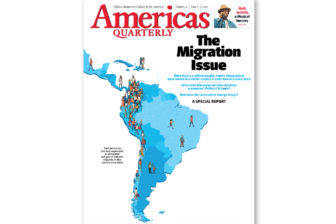This article is the second of a two-part series on the politics of immigration reform. (Read part 1.)
This has been a bad year for supporters of comprehensive immigration reform (CIR). With nativist legislation (
Since its inception, the pro-CIR movement has had to adapt to different political moments. The movement’s umbrella organization, Reform Immigration FOR America (RIFA), spent much of this year on rallies and civil disobedience demanding action from Senate Democrats and calling attention to the cost of punitive policies.
This summer, RIFA shifted its focus to mobilizing Latino and immigrant voters. RIFA leaders felt the need to show both parties that 2008—when the Latino vote proved critical to the Democratic sweep—was not an anomaly, but instead a harbinger of a new American political chessboard, in which Latinos transform from pawns to major pieces. As Ali Noorani, Executive Director of the National Immigration Forum, explained, “This is all about our ability to mobilize the immigrant vote. In 2004, 2006 and 2008, it was incredibly clear that the new American voter is paying special attention to candidates’ positions on immigration reform. We know that, in order to be successful, we have to turnout on November 2.”
The turnout story, however, may prove tricky. Certainly, if progressive groups get immigrants and Latinos to the polls and these voters play a decisive role in key races, it could provide a stern warning for the GOP to change course and for the Democrats to act more quickly on CIR.
But there is also concern that Latinos may stay away from the polls because, while Republicans have offered no promising solutions on immigration, Democrats have not solved the problem, either. Low Latino turnout could lead political strategists to view 2008 as an aberration and to dismiss the Latino vote as of only marginal importance for future elections. This would be disastrous for RIFA, as it would lower CIR’s odds in Congress.
Republican obstructionism on immigration, however, may have inadvertently helped avert RIFA’s nightmare scenario. Following
Prospects for Legislation in the Next Six Months
Just before the Senate adjourned in September, Senator Robert Menendez (D-NJ) introduced a CIR bill. RIFA praised Menendez for the move, but, by all accounts, the odds of its passage in 2010 or early 2011 are slim. Piecemeal legislation, however, may have a better chance.
Some CIR advocates are optimistic that the DREAM Act or the AgJOBS Bill could pass in the lame-duck session. The DREAM (Development, Relief and Education for Alien Minors) Act would offer citizenship for undocumented students who were brought into the country by immigrant parents and agree to go to college or the military. AgJOBS (The Agricultural Job Opportunities, Benefits and Security Act) would entail legalization for undocumented farmworkers without criminal records who agree to pay a fine and any unpaid taxes.
In September, Senate Majority Leader Harry Reid introduced the DREAM Act as part of defense legislation. AgJOBs is under consideration in the House, where it enjoys bipartisan support. As Lynn Tramonte, Deputy Director of
DREAM and AgJOBS, then, could offer ways for pro-immigrant advocates to claim concrete victories in this uncertain political climate. But Republicans responded harshly to Reid’s recent move, with Representative Lamar Smith (R-TX) deeming it a “cynical pre-election ploy” and Senator Orrin Hatch’s (R-UT) spokeswoman dismissing it as a “political stunt”.
Ultimately, Republicans managed to filibuster DREAM. But DREAM’s supporters vowed to renew the fight after the elections.
Some CIR advocates, though, fear the piecemeal route because of Democratic leaders’ limited political capital. Many Democrats in Congress would prefer to vote once on immigration and be done with it. They would resist piecemeal efforts that would force them to vote several times for pro-immigrant stances, which could increase their vulnerability to attacks from the Right. After voting on DREAM or AgJOBS, some could tell the leadership that they are not willing to risk another immigration vote. President Obama alluded to this scenario: “I just don’t want anybody to think that if we somehow just do the DREAM Act, that that solves the problem…We’ve got a bigger problem that we have to solve. We still need comprehensive immigration reform.”
So while CIR advocates continue to push for DREAM and AgJOBS, the path from passing either bill (no done deal) to winning on CIR remains uncertain.
November’s election results could create further obstacles. If, as expected, the Democrats lose control of the House, CIR may have to wait until after the next election—i.e., 2012—as Senate Democrats could become even more reluctant to push a bill with reduced odds of passing in the House. Ali Noorani acknowledged: “I think, if the Democrats lose the House, a lot of us are playing defense on a lot of issues.” Even if Democrats maintain the House, the margins in both chambers of Congress will be slimmer, which would force Democrats to court even more Republican support.
The post-election scenario largely depends on Republican strategy. One potential upside for CIR advocates would be Senator Graham returning to the negotiating table to hammer out a draft CIR bill. According to a Senate source, Graham (whose office did not respond to an interview request) has already indicated interest in resuming negotiations. Senator Schumer’s office has also begun preparations for business-labor talks.
Another potential boon for CIR advocates could occur if the election results increase concern among Republican presidential front-runners and GOP party leaders about alienating Latino voters before another presidential election. As Tamar Jacoby, President and CEO of ImmigrationWorks USA, explained, “I think Republicans want to get this off their list of demerits with Latino voters.” If candidates and GOP leaders want immigration off-the-table for the next campaign, they could press Republicans in Congress to compromise.
To have any chance of passing CIR in 2011, then, would probably require several key ingredients. First, RIFA needs to sustain grassroots efforts that keeps the pressure on legislators without alienating the country’s ideological and geographical center. Grassroots mobilization has been critical to the movement’s successes; it must be sustained for CIR to have a chance.
But, as was the case in 2007, grassroots mobilization won’t be enough. The second key factor will be a strong Latino showing in the mid-term elections. To make their case after Election Day, pro-immigrant advocates need to be able to identify key races where Latino and immigrant voters shaped the outcomes.
Third, organize labor needs to maintain unity and reach compromise with the business community. For CIR to have a chance in 2011, its advocates need to anticipate and address potential conflicts on future immigration and guest worker issues. While the nation has recently focused on enforcement and undocumented people, setting future immigration levels could become just as thorny an issue in legislative negotiations.
How many people to allow into the country in the future, and how to go about doing it, has always been a flashpoint in business-labor negotiations. Now, labor is united on establishing a commission to determine immigration levels, while, according to Ms. Jacoby, “business believes that the market should set future immigration levels, not a commission that would be politicized.”
Finally, the pro-CIR camp needs to scale up coalitions with conservative allies. This will involve getting the Chamber of Commerce and other business groups more involved and increasing collaboration with evangelical leaders—an incipient source of support—to pressure conservatives that immigrant rights groups alone cannot reach. The current pro-CIR tent includes millions of people who have proven their willingness to take to the streets for immigration reform. But this tent must expand for CIR advocates to muster the necessary votes.
In sum, after garnering attention with grassroots efforts across the country, the pro-CIR movement now finds itself in a moment of great uncertainty. Immigration reform remains subject to the vicissitudes of the American electorate in the wake of a severe economic downturn, when nativist appeals have gained considerable traction.
In the coming months, RIFA and its member groups will mobilize to pressure elected officials and continue trying to raise consciousness among non-immigrant communities. But unless they can muster a political game-changer in November, these efforts may fall as short as those that preceded the Senate’s failure to pass CIR in 2007.






